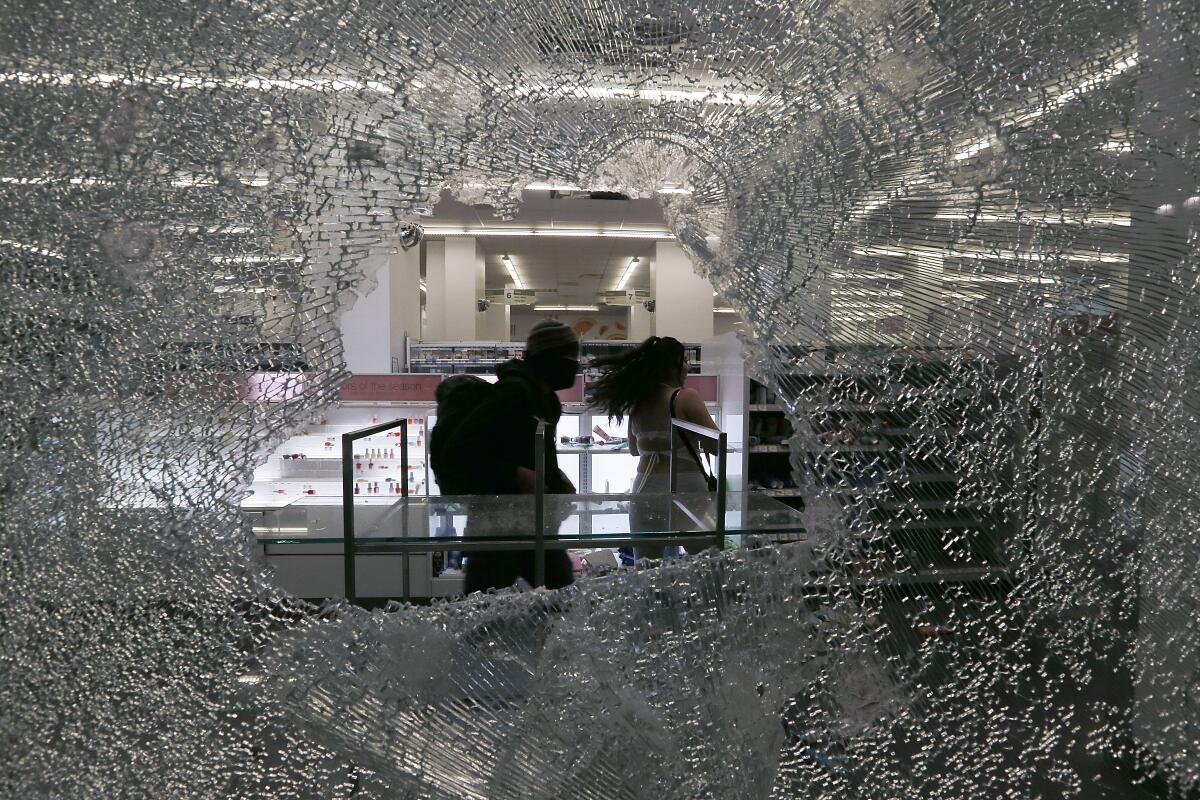DEA investigating drug thefts and damage at 177 pharmacies in L.A. area

- Share via
At least 177 pharmacies were burglarized or damaged during recent unrest in the Los Angeles area, disrupting some residents’ access to medication and raising concerns that the stolen drugs will be resold on the street.
Local and federal law enforcement officials believe organized groups targeted the businesses because they stock prescription drugs, which are easy to carry off in large amounts and can be resold for a high profit on the street. Officials said the groups took advantage of the peaceful protests and were not connected to them.
The U.S. Drug Enforcement Administration totted up 177 pharmacies burglarized or damaged in Los Angeles and Riverside counties, agency officials said. Two pharmacies — one in Huntington Park and one in Van Nuys — were destroyed by fire.
The DEA also has received 54 reports from pharmacies in the two counties of more than $534,000 in thefts and damage. Many other pharmacies in the region “are still in the process of taking inventory and will report their losses in the future,” the DEA said.
Such reports are mandated when licensed pharmacies lose significant amounts of controlled substances, like prescription opioids. Such medications have helped fuel the nation’s deadly opioid epidemic.
The DEA said it was working with the California State Board of Pharmacy and local law enforcement agencies to investigate the thefts.
Los Angeles Police Chief Michel Moore said federal agents had told him that the pharmacies were intentionally targeted.
The Board of Pharmacy issued a statement earlier this month advising pharmacies in “impacted areas” to board up their buildings to limit damage and “prevent drug losses,” and to move inventory and sensitive medical records to safer locations. It also advised them to “inventory all dangerous drugs and devices to identify any losses.”
The board also said pharmacies should carefully check drugs that were in areas that were broken into but were left behind by burglars to be sure they were not tampered with.
It noted that pharmacies were required to report losses to it and the DEA and said security videos should be saved for the police and the DEA.
As for patients whose pharmacies were closed as a result of the unrest, Department of Consumer Affairs spokeswoman Veronica Harms said the pharmacy board recommended that they reach out to have their prescriptions sent to another pharmacy to be filled or ask their provider if they could receive their medicines another way.
As a rule, she noted, patients should keep a list of their medical contacts and current medications in the event of an emergency.
CVS, a pharmacy chain with a large presence in the region, said it had at least 10 store closures in Los Angeles and some damage. Other stores were temporarily closed “as a precaution to keep our employees safe,” said Amy Thibault, a company spokeswoman.
Customers whose pharmacies were closed were temporarily rerouted to other stores nearby, Thibault said. As of this week, only one CVS store, in the 1300 block of South La Brea Avenue, remained closed. Reopening is expected next month after repairs are completed.
“Each closed pharmacy’s phone system has been rerouted to a nearby CVS Pharmacy that is open so all patients will continue to have access to pharmacy care,” Thibault said.
In 2015, nearly 30 pharmacies in Baltimore were broken into during unrest following the death of Freddie Gray from injuries suffered in police custody. Law enforcement in Baltimore also believed then that organized groups were responsible and said the stolen drugs were eventually sold off in open-air drug markets in the city.
The DEA investigated those incidents as well. It initially calculated 175,000 drug doses had been stolen but later upped that count to nearly 315,000 doses — more than 40% of which were powerful opioids including fentanyl, methadone and oxycodone.
Harms said pharmacies in Los Angeles would have to conduct their own audits to determine their losses individually before reporting those figures to the DEA.
Los Angeles Times reporters Jaclyn Cosgrove, Melissa Etehad and Tania Ganguli contributed to this article.
More to Read
Sign up for Essential California
The most important California stories and recommendations in your inbox every morning.
You may occasionally receive promotional content from the Los Angeles Times.











